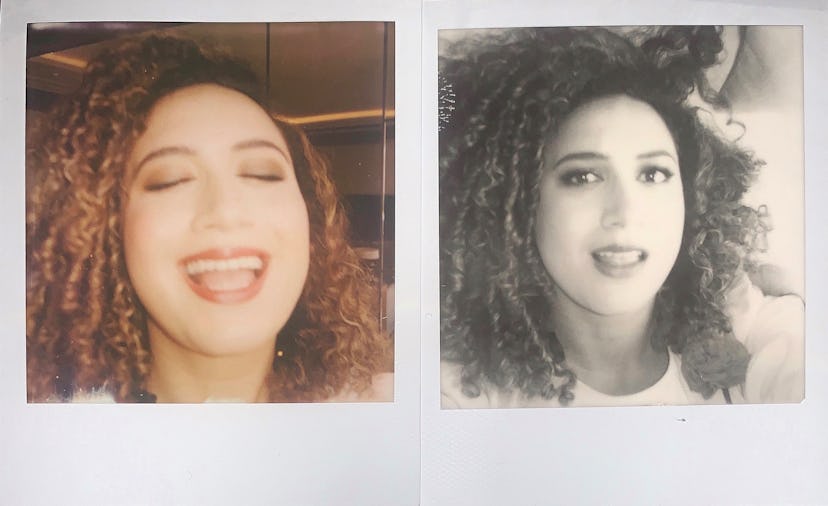Starstruck Creator Rose Matafeo Wrote the Romantic Comedy She Wanted to See

Having a one-night stand with a celebrity sounds like the stuff of fan fiction, but in Rose Matafeo’s Starstruck, it’s just the beginning of an unpredictable romantic adventure. Matafeo, who co-wrote the series with Alice Snedden and stars as Jessie, the series protagonist who ends up in a romantic will they, won’t they entanglement with a famous British movie star (played by Nikesh Patel). Matafeo, who grew up in New Zealand and cut her teeth in Auckland’s comedy scene, moved to London in 2015, where she still resides and spoke to W via Zoom about the success of her hit show.
Growing up, the comedian’s mother introduced her to American comedians like Mitch Hedberg, Demetri Martin, and Maria Bamford. British and Irish performers like Josie Long and David O’Doherty would make a tour stop in Auckland, where Matafeo was born and raised. “Because New Zealand is so small,” she explained, “you would actually get to hang out with them.” Of course, Matafeo noted that she also came up during the height of Flight of the Concords’s international fame, which put New Zealand comedy on the map in the mid-aughts. “I stand on the shoulders of giant nerds,” she said, citing their whimsical comedy as highly influential on her own sense of humor.
It’s an influence that can be felt in her HBO Max comedy special, Horndog, which aired on the streaming platform last year and received critical acclaim for her jokes about obsessing over pop culture, feeling insecure about her body count, and taking a solo trip to Palm Springs. And while Matafeo began pursuing comedy as a teenager, she said it was not until “very recently” that reality set in: this is her full-time job. “I kept doing it, and accidentally kept doing it, and gained no other skills and sort of painted myself into a corner where I went, I have to do this now, I suppose,” she said with a laugh. “It is slightly daunting when you start being introduced as a comedian.”
What you need to know about Matafeo is that, while she is a writer, actress, and director, she is also primarily a pop culture-obsessed fan—of old Hollywood cinema, of K-pop, of romantic comedies. “When it comes to making anything, it’s going to be about what I’m passionate about at the time,” she said. “I love film, and I think a lot of Starstruck owes itself to my appreciation of film.”
In Starstruck, Matafeo’s Jessie is a down-on-her-luck Millennial juggling multiple jobs, working part time at a cinema where everyone in the lobby is working on a draft of their screenplay (à la Metrograph in New York), part-time babysitting, and eventually part time with her roommate and best friend at a flower delivery service. The six-part series, which was renewed for a second season before the first season aired last month in the U.K., begins with a very drunk Jessie at a New Years’ Eve party in a London bar. She goes home with a guy she meets—and does not hit it off with initially—and the next morning, discovers that her one-night stand named Tom Kapoor is actually a huge movie star. You might think you could guess what happens next, but the structure of the series provides an unpredictability that will leave you pleasantly surprised over the course of the show.
In recent years, audiences have seen an uptick in irreverent series written by and starring a woman creator playing a satirized version of themselves; we’ve seen it from Issa Rae, Phoebe Waller-Bridge, and Lena Dunham. Matafeo’s Starstruck feels different, though. It’s more of a six-episode long movie than a sitcom, born from the mind of a film fanatic (and self-described nerd) who cites classic Hollywood cinema as a big influence.
Of course, Starstruck—which will premiere on HBO Max on June 10—will inevitably draw Notting Hill comparisons, but as Matafeo pointed out, the root of that story has been done many times. Roman Holiday, Singin’ in the Rain, and Sweet Charity all incorporate elements of the trope of a regular person who becomes entangled with a star. “Rom-coms can become dated, particularly with the gender politics of the era that they live in, and sometimes you remember something as your favorite film, but then you re-watch it and you’re like, Oh that’s not good,” Matafeo went on. “That could happen to Starstruck, and it would be great because it would mean that society has progressed.”
To Matafeo, romantic comedies are still timeless. “There are so many ways to engage with and relate to a rom-com, even though it’s a genre that a lot of people diminish—in an annoyingly disgusting gendered way,” she explained. “I wanted to write something nice that makes people feel nice, and from a female perspective” she said. “It’s nice to make an updated version of that that still honors rom-com traditions in a loving way. Why did I write a rom-com? Because I like watching them, and it was in my wheelhouse.”
This article was originally published on